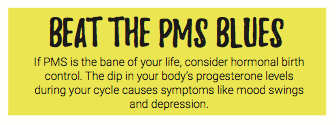
For many, contraception is a necessity. But what works for one person may not for another

There’s no “one size fits all” when it comes to your health. The decision to start a new form of contraception should be thoroughly researched and discussed with a doctor. Still, it’s a good idea to look at all the options, consider your needs, and make a choice that’s right for your lifestyle, body and mental health.
Hormonal or non-hormonal?
Last year, a study was published showing a correlation between the pill and depression. Researchers from the University of Copenhagen found that those on the combined pill were 23% more likely to be prescribed antidepressants. But this problem isn’t restricted to the pill. Any form of contraception that uses artificial hormones, including patches, injections, the implant, Mirena coils, and vaginal rings pose the same risk. While hormonal contraception suits many women, if you start experiencing severe mood swings, depression or anxiety, it’s worth considering non-hormonal options such as condoms, the copper IUD, diaphragms, cervical caps, and the rhythm method/fertility tracking.
Oestrogen, progesterone, or both?
Women on progesterone-only pills are 34% more likely to be prescribed antidepressants, up 11% on those who use the combined pill
When it comes to hormonal contraception there are two options: combined (oestrogen and progesterone) or progesterone-only. Some women find that they react badly to synthetic oestrogen and it’s not suitable for those who suffer with migraines and other conditions, such as diabetes. Contraceptives that work with progesterone, including the progesterone-only pill, the implant, and injectables, can be used by most women and are generally tolerated better than combined hormonal methods. However, those on progesterone-only pills are 34% more likely to be prescribed antidepressants, up 11% on those who use the combined pill, so be mindful of any changes in your mood.
Age dependent?
While there is no age limit for contraceptives, there are benefits of taking different forms throughout your life. Young women suffering from teenage acne may find some relief from the combined pill. Some older women who are not planning on having children choose sterilisation; however, this is not an option that everyone is comfortable with. If you are experiencing heavy perimenopausal bleeding, oral contraceptives and IUD can help control this. However, contraceptives that have a “withdrawal bleed” may mean it’s harder to tell when you have reached menopause. For this reason, over 50s may want to consider non-hormonal methods.

Lifestyle choices?
If you’re not yet planning on getting pregnant, you may want to choose a long-acting reversible contraceptive (LARC) such as an IUD/IUS, which lasts up to 10 years, or the implant, which can last between three and five years. It’s worth thinking about what kind of frequency works best for you. Injections are administered every three months, vaginal rings monthly, patches weekly, and pills every day. Progesterone-only pills should be taken at the same time every day, whereas the combined pill has a buffer of a few hours either side. Consider your routine and pick a contraceptive that suits your lifestyle.
Clashing with other medication
Some medications may clash or make your contraception less effective. While your doctor will be able to give you specific advice, there are general guidelines to follow when choosing contraception. Firstly, the only forms of contraception that will be affected by medication are hormonal, with some worse than others. For example, the combined pill cannot be taken with epilepsy drugs, or antiretroviral medicines used to treat HIV. If you’re taking antibiotics, or medication that causes diarrhoea, the effectivity of your contraception could decreased and you should look into using additional contraception, such as condoms, throughout the course of medication.
Treating PMS, anxiety and depression

While in some cases hormonal contraception can cause feelings of anxiety and depression, for others it can control these symptoms. During your period, it is common to experience premenstrual syndrome (PMS). Everyone experiences PMS differently, but common symptoms include mood swings, irritability, restlessness, lowered self-esteem, anxiety and depression. PMS is caused by changing hormone levels. Hormonal birth-control stabilises the hormone levels in the body, meaning that the anxiety and depression that comes with PMS is prevented. Progesterone-only contraceptives are effective as it’s the dip in progesterone during a natural cycle that causes the PMS symptoms.
Dealing with periods

Periods are not always easy and, for some, dealing with your time of the month can be a nightmare. Whatever the problem, be it painful, heavy periods, gender dysphoria, or simply the annoyance, hormonal contraceptives can be an effective way to tackle period problems while also protecting you from pregnancy. It’s possible to skip a period by taking two packets of the pill back-to-back, which is handy for holidays and important dates. But it’s also possible to completely, and safely, stop periods long-term with “extended” or “continuous” contraception such as the hormonal IUD, implant and injectables.

